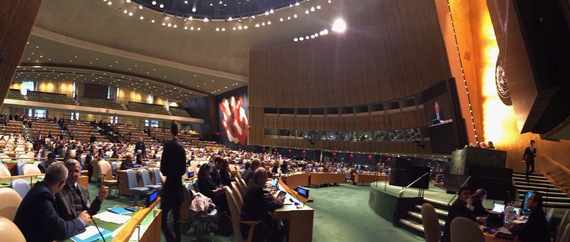As more and more people use and rely on the Internet around the globe, one of the key questions is how it should be governed - and who should set the rules. Now, the question of Internet governance might not keep everyone up at night, but the answer affects all of us, which is why a U.S. State Department-led team was up negotiating this issue at three in the morning at a critical United Nations meeting earlier this month.
Here's what's at stake. Will the Internet remain a free and open global platform that drives economic opportunity and helps people exercise human rights, including the freedom of expression and assembly? Or will it splinter under the control of various governments, serving as a tool that repressive regimes use to deny citizens these very rights?
Some countries and activists have called for more governmental control over the Internet, or "cyber sovereignty," proposing the establishment of an international legal instrument for Internet governance, an international treaty on cybersecurity, a UN convention on cybercrime, or a special session of the UN General Assembly on the role of governments in the Internet.
The United States and many of our allies believe that this type of excessive intergovernmental interference would have dire consequences. Instead, governments must remain one of many voices - along with engineers, business owners, advocates, academics and scientists - that collaborate in governing the Internet.
On December 12, well into the wee hours of the morning, in "the city that never sleeps," the United States worked to secure a global consensus in support of this "multi-stakeholder" approach at a UN meeting called the Ten-Year Review of the World Summit on the Information Society (WSIS+10). We succeeded. After intense discussions, the talented chairpersons from the UAE and Latvia gained agreement on the WSIS+10 outcome document, which contains international principles that will guide the UN's work on information and communication technology (ICT) issues going forward.
Our WSIS team - superbly led by the State Department's top official in this area, Daniel Sepulveda - prioritized listening to our stakeholders, hearing out other nations, and doing what we could to help everyone achieve their goals, even as we stayed true to our principles and mandate. Working with his colleagues, Ambassador Sepulveda convinced participants to reaffirm and commit to the existing, inclusive model of Internet governance. Additionally, a consensus recognized the need to harness ICTs to support economic development, and also secured an extension of the Internet Governance Forum's mandate.
Just as important, our team achieved consensus on how to evaluate the success of the global information society's development going forward - not just in economic terms, but also according to the degree to which it protects all people's internationally recognized human rights.
Leaders ranging from the Internet Society and the President of ICANN to global industry and civil society, have declared the negotiations and outcome document a success for the Internet community. The deliberations that led to this valuable consensus were often intense and passionate, but never disrespectful. It's been said that the measure of a successful negotiation is not just whether or not you are able to meet your negotiating objectives, but whether or not you were also able to strengthen your relationships with the stakeholders you represent, as well as your negotiating partners, through the process. I believe the team achieved both ends.
It is now up to us all to give life to these words and commitments and continue our efforts to grow the global information society together. By focusing on empowering people to fulfill their potential and pursue their dreams using the transformative power of the Internet, we can help continue to drive shared prosperity worldwide.
